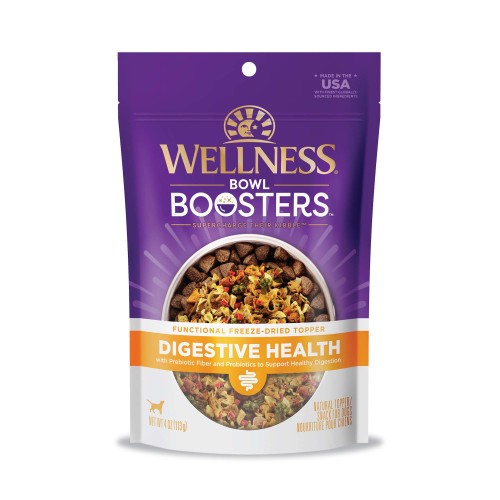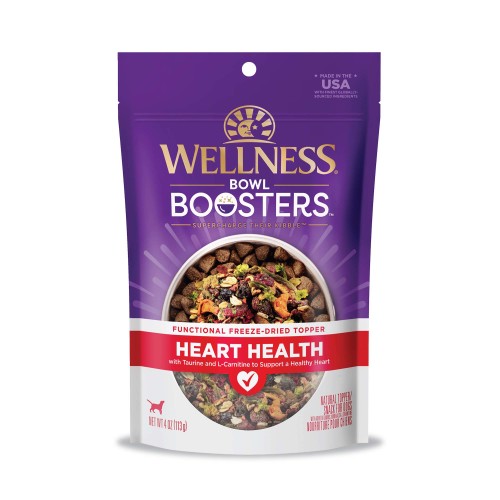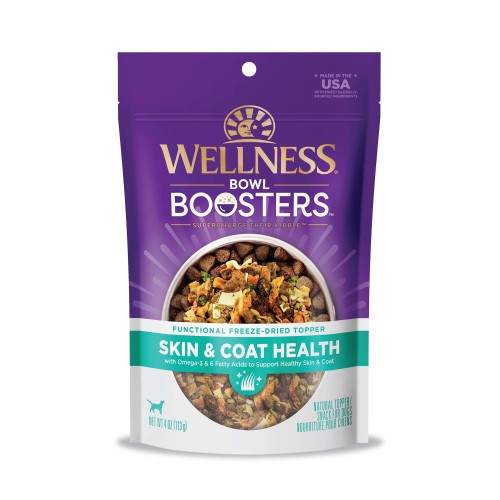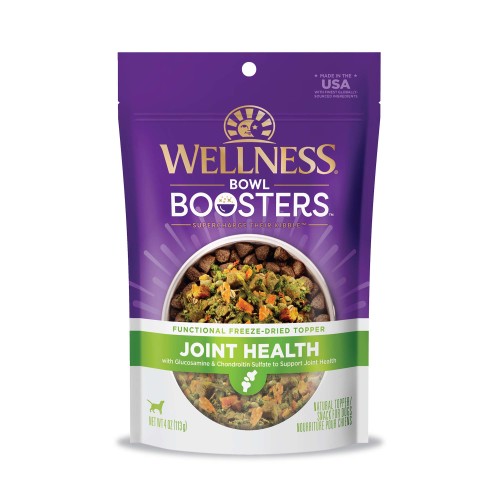March 22, 2023
The Best Puppy Food For A Sensitive Stomach
Best Puppy Food For Sensitive Stomach
Puppies grow quickly, building muscles and bones, developing organs and strengthening vital systems such as their immunity and brain function. During this physical development they are facing important first-time encounters with food and experiences. With so much going on, it’s not uncommon for a new pup to occasionally get a mild upset tummy. Signs of a sensitive stomach in a puppy can include indigestion, diarrhea or loose stools, constipation, excessive gassiness and vomiting.
First, ensure there is no serious health issue with your puppy by talking to your veterinarian as signs of digestive upsets can be caused by a variety of things. If everything else is ruled out and your veterinarian agrees there may be a food sensitivity then there are many things you can do to support your puppy’s sensitive stomach, including finding the best puppy food for sensitive stomachs

1. Ease Into New Puppy Food
With a new puppy at home, some initial stomach upset can be normal and in fact expected when your pup first comes home. A puppy’s first few days at their new home can be stressful, leading to loose stools for 1-3 days. To help ease them into their new home, it’s best to continue feeding what the breeder or shelter gave you for the first week. Ensure that your pup has plenty of water and rest.
Once your pup starts to get settled you can gradually transition them to a new food. I recommend our Wellness Complete Health for Puppies recipe for a wholesome option with grains, or our Wellness CORE Puppy grain-free dry formula for puppies with very active lifestyles. Each of these options are made with high-quality, natural ingredients.
2. Avoid Overfeeding
That said, it’s important to ensure you’re not overfeeding your new pup which can lead not only to unwanted weight gain but potentially also a stomach upset. A high-quality, meat-based food will be nutrient-rich meaning you can feed less to suit their smaller stomach size, but also meet their unique growth needs. Key to determining the right amount to feed is to check the recommended feeding amounts. These change as a puppy grows so make sure to always turn the bag over and check the exact amount to feed your pup.
Depending on the breed and age of your puppy, their stomach can range from the size of a chestnut to a tennis ball—both are rather small.
3. Avoid Giving Table Scraps
We all know and love those puppy dog eyes, but it’s important to resist giving them food off your plate. Even giving them a small piece or two of what you are eating can easily cause an intestinal upset in your puppy from the sudden difference in nutrition, especially when it comes to higher fat foods. For example, giving your puppy a single piece of bacon is comparable calorie-wise to a human eating 13 pieces of bacon!
4. Give Treats In Moderation
Owning a new puppy means lots of training to ensure good manners as well as fun tricks you both can perform together! The role of positive reinforcement training is fundamental and offering treats is an easy, effective reward. Remember, though, puppy treats should be the same high-quality as their food. Avoid high-fat sausages or strips, inferior quality ingredients and high levels of salt, all of which can cause stomach upset in puppies.
Instead, use a healthy puppy treat like Wellness Puppy Bites Soft Lamb & Salmon. Wellness Puppy Bites contain DHA for puppies’ brain development and contain no meat by-products, corn, wheat, dairy, artificial colors or flavors which could contribute to a sensitive stomach. These super-moist treats can even be cut or ripped so you don’t overfeed while training.
5. Transition Between Puppy Foods Carefully
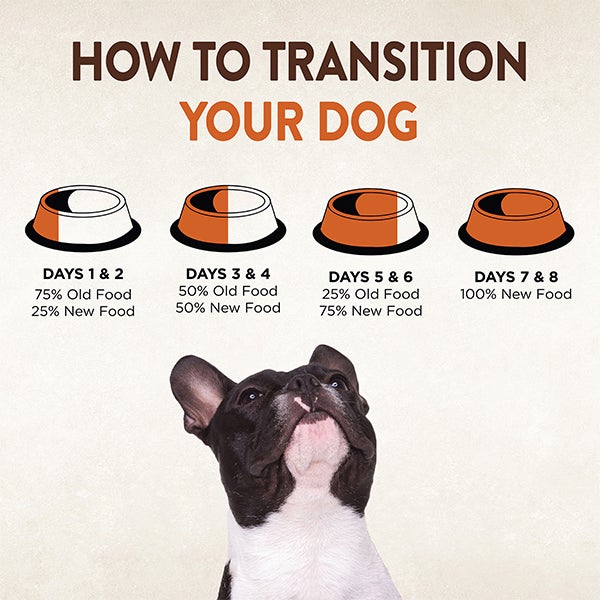
In a pup’s first year you may experiment with different foods. Whilst it’s vital to ensure your pup is eating high-quality nutrition, you must introduce all foods gradually over at least 4-7 days, longer than the recommendation for adult dogs (3-4 days). Your puppy’s intestinal tract is still developing. Prevent diarrhea by slowly mixing your pup’s new food into their existing diet, subtracting a little more of the old food each day.
6. Support Their Microflora With Probiotics
Your puppy’s diet and environment have an impact on the trillions of good and bad bacteria that are developing in their intestinal tract. Puppies usually maintain a healthy balance of bacteria; however, in cases where a pup eats spoiled leftovers in the trash or has periods of significant stress, bad gut bacteria can increase, leading to an upset stomach. To help improve your pup’s gut health, choose a puppy food rich in prebiotics and guaranteed probiotics.
Not many puppy foods have guaranteed levels of probiotics, so it’s important to check the Guaranteed Analysis on the back of your puppy’s food bag. Wellness dry recipes for puppies have guaranteed levels of probiotics to support gut health. Our Wellness dry food recipes for puppies also include a prebiotic, Chicory Root Extract and healthy dietary fiber to support digestive health as well as an optimal balance of the microbiome
7. Manage Their Stress
One of the most common, least suspected causes of diarrhea in puppies is stress. To a new puppy that first car trip, day out at the dog park or trip to the veterinarian can cause anxiety and worry that may present as loose stools. Help them acclimate gradually—keep car rides short, pick a slow time at the dog park and make sure they get plenty of positive reinforcement whilst at the vet. This will give your pup confidence and reduce stress.
8. Puppy Proof To Ensure They Don’t Eat Unsafe Things
When teething, puppies love to ease discomfort by chewing and can accidentally get a hold of household items or clothing. If your pup has serious vomiting or diarrhea, it’s possible that something is stuck in their intestinal tract. If you suspect your puppy got into something and may have a blockage, you should immediately bring your pup to the veterinarian. Read more about how to puppy proof your home to avoid any issues.
9. Investigate The Possibility Of A Food Allergy
New pet parents often suspect a food allergy is the culprit of their pup’s upset tummy. Although dogs can have allergic responses, the true number of dogs diagnosed with food allergies is quite small. Common food allergies for dogs are chicken, beef, dairy products, corn and wheat. Allergies trigger an immediate immune response, can develop at any age and can start even if the dog has been eating the same food consistently without a previous allergy. Symptoms include upset stomach, itchy skin and hair loss. Although you’ll need to have a veterinarian diagnose your pup’s allergies, switching them to a puppy limited ingredient or natural diet with high-quality ingredients may help your pup feel better. All Wellness recipes are made with high-quality ingredients and do not contain corn, wheat or soy, or artificial flavors, colors or preservatives.
10. Investigate The Possibility Of A Food Sensitivity
Like food allergies, food sensitivities can cause itchy skin and hair loss, but symptom onset will often be more gradual and doesn’t involve an immune system response. Food sensitivities in puppies can be caused by individual ingredients or could occur when a puppy food’s macro nutrients (either carbohydrates or fats) are included in excess. Symptoms in food sensitive pups can often be resolved by moving them to a high-quality, natural, balanced diet that has the right balance of macro nutrients (and no fillers) and avoids common food ingredients that dogs are known to react to.



